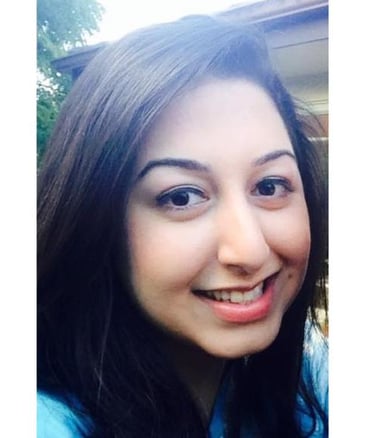Beyond the Bio: A Q&A with Rushaina, Our Psychologist and Contributor
Q & A
Janine BSci BHSci (Nursing) PGCertPHC NZRN AUSRN
8/1/20254 min read
Were there any specific experiences (personal or professional) that solidified your interest in this specialisation within psychology?
I have always been passionate about the intersectionality between physical and mental health. I think people believe that mental health is separate to physical health, but actually both of these pillars of health function in unison. As you would expect to take care of yourself if you had a cold/flu - unwell with a physical health condition, the same principles would apply if you have mental health issues. I also remember this one time I was working alongside a client who was diagnosed with Chronic Obstructive Pulmonary Disease (COPD) who had felt invalidated for a long period of time, going to multiple specialists but felt no one understood her struggles. Our sessions were focused on managing both of these conditions together, and she was able to manage many of her symptoms successfully. This was one of my very first clients during my internship year and highlighted the power of health psychology as a discipline.
What are the most common conditions or challenges you address with your clients/patients?
I have primarily worked alongside clients who have chronic illnesses or injuries and subsequent mental health issues as a result. Some common conditions include chronic pain from shoulder or back injuries, rheumatoid arthritis, cancer, IBD, and diabetes. Thus, helping clients accept their diagnoses, or the state of their current functioning is a significant part of my role. The most common mental health issues I work with are mood, adjustment and anxiety disorders, including sleep issues and stress management.
What are the most rewarding aspects of being a health psychologist? Describe a time when you felt truly fulfilled.
While this is challenging work, there are truly numerous rewards! Walking alongside clients, watching them make meaningful change and holding space for them in sessions are some of the best aspects of this role. I always feel so honored to be doing this work because I can imagine how tough it may be to be vulnerable and share your deepest thoughts and emotions. Similar to the above situation, the most fulfilling moments are when clients report this journey has been life-changing for them and they are better able to manage their health conditions alongside their mental health.
Beyond your professional life, how do you maintain your own health and well-being to prevent burn-out given the nature of your work?
I am blessed to have a really strong support network around me in the form of my peers, supervisor, family and friends. Practicing what I preach is important, so I always take the time out to share my emotions and thoughts with those around me. Burnout is a real struggle in this profession, but being mindful and reflective in my practice also helps me identify when tough moments impact me. Outside of my work, I also engage in lotssss of self-care, setting boundaries, engaging in activities that make me feel good and spending time with my loved ones.
How would you define “living well”?
Living well to me would be the basic fundamentals of eating well, moving well, sleeping well and feeling well. I always say its upto you to decide what’s important for you and to live a life in accordance with that.
What advice would you give to someone currently going through a similar challenging time?
I always say challenges and psychological suffering are inevitable and a common part of human life. However, learning the tools and strategies to help support yourself during these challenges can make all the difference. While we may not be able to control the outcome, we can most definitely control the journey and how we respond to challenges. You are a lot more capable than you realise. Change happens one step at a time. I always describe therapy as short term ‘pain’ for long-term gain. It’s an investment in yourself and your future. So please get some help and advocate for your needs.
Is there anything else you’d like to share about your journey in becoming a health psychologist, or a challenging time that would inspire our readers at Mindful & Powerful Within?
The journey towards becoming a health psychologist has not been easy by any means, but has been absolutely worth it! Many challenges have occurred throughout my journey such as experiencing resistance or hesitancy to change from clients, feeling helpless and stuck at times and recognising the limitations of the system we work in. I’ve had many clients tell me they don’t believe depression or anxiety are real, or that there is no way a psychologist can help with chronic pain. I’ve had people tell me “I am not crazy so I don’t need a psychologist” and “there is no point in me coming to see you, you can never be of help to me”. However, all of these challenges have made the work even more rewarding, and that when behaviour change occurs, how it can be even more special.


What drew you to the field of health psychology?
Coming from a collectivist Asian culture, I recognised the stigmas associated with mental health from a very young age. I noticed how people within my community were emotionally unavailable, fearful of emotion expression and dismissive of mental health issues. I quickly learnt this was related to dysfunctional patterns of behaviours but also systemic weaknesses which did not honor Asian views of ‘being’ in the world. These thoughts solidified my vision to break the cycle and pursue health psychology.
Empower Your Mind, Embrace Your Strength


Sign up to receive our Mindful & Powerful Within newsletter to stay updated on new blog posts, helpful resources, exclusive wellness tips and upcoming products designed to support your mental health and chronic illness journey
Stay informed & inspired
Disclaimer
The content on this website is for general knowledge and informational purposes only and should not be considered medical advice. All information presented is carefully sourced from peer-reviewed journals, reputable medical organisations, certified NZ & Australian health professionals with a current APC, and other credible sources. The content is regularly reviewed quarterly to ensure its accuracy and relevance. However, it is not intended to be a substitute for professional medical advice, diagnosis, or treatment and should not be used to diagnose or treat any health condition.
Using this website does not create a health professional-client relationship. We do not accept clients or offer individual consultations. For medical advice and treatment, please consult your personal physician or other qualified healthcare provider with any questions you may have regarding a medical condition.
© 2025 Mindful & Powerful Within Limited | All Rights Reserved | Wellington, New Zealand
©
